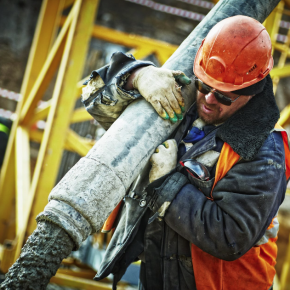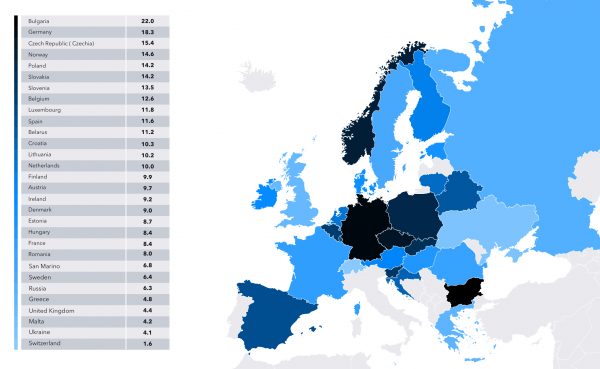
GUEST ARTICLE: Why are UK construction workers reluctant to take sick days?
British workers took the fourth-lowest amount of sick days in Europe last year, according to new research that identifies the countries most and least notorious for pulling a sickie.
Despite construction workers taking the highest proportion of sick days across sectors due to accidents at work, the research from time and workforce management solutions provider Mitrefinch, found that workers in the UK took the fourth-lowest amount of days off sick when compared to the rest of Europe in 2018, an average of 4.4 days.
Switzerland topped the charts when it came to excellent attendance with its workers taking just 1.6 days sick leave on average over the course of a calendar year. Ukraine (4.1 days) and Malta (4.2 days) made up the rest of the top three.
While the stats for Swiss workers are impressive, it’s important to note that companies in the country are also notoriously generous when it comes to annual leave entitlement – the average worker took over five weeks holiday according to recent statistics – making the efforts by injured British construction workers even more impressive.
However, recent figures suggest that more than two-thirds of UK workers avoid taking sick days and still go into work when feeling unwell. These worrying figures could imply construction workers feel pressured to attend work when injured or sick, linking back to corporate culture and attitudes across different nations.
Bulgarian employees were found most likely to call in sick, taking on average 22 days off per year according to the most recent figures available. Workers in Germany didn’t fare too much better taking 18.3 days, with those in the Czech Republic also taking off the equivalent of more than three working weeks with sickness (15.4 days).
The full results and visual can be found below:

Matthew Jenkins, CEO at Mitrefinch, comments: “Workplace absences cost the UK economy a whopping £18 billion a year through lost productivity, with this figure expected to creep up to £21 billion in 2020 – causing significant losses for the construction industry as a whole. On top of the dip in productivity, construction employees who repeatedly call in sick put a strain on other members of staff who have to pick up their workload, often physical labour, which can impact workplace morale.
“However, that’s not to say taking a sick day should be seen as a weakness or a lack of commitment. Taking time out of a construction job to recover from injury or illness is integral to the productivity and growth of the industry and the fact that more than two-thirds of UK workers admit going to work when feeling sick is a serious cause for concern.”
Lizzie Benton, culture consultant at Liberty Mind, adds: “In Britain, we still live by outdated legacy attitudes in the workplace. Fear and control is what many organisations are run by and for employees, asking for a day off sick is like showing a weakness, or admitting a failure. We all think we should ‘keep calm and carry on’.
“It’s not just the act of taking a day off, but the repercussions this may have when an employee returns to work. Managers treating them coldly, or over-questioning their day off as if to assume they were faking it in some way.
“I think managers often behave this way because it is bred in the company culture. Attitudes and behaviours start at the top, and if you have a boss who comes in no matter how they’re feeling you create a culture where people feel they can’t take a sick day. Trust is also a key issue. There are many organisations who have trust issues with their employees and which have policies to control their people rather than help them thrive. Too many businesses still believe that people are just there for the pay cheque and will do anything to get the most out of the company. There is no empathy and a severe lack of emotional intelligence.”
Tips for HRs on increasing attendance of construction employees
Keep track of your employees sick days
Construction workers are often employed in vast numbers, meaning their absences can go unnoticed. Monitoring the sick leave your employees take is the first step, allowing any patterns of illness to be logged or flagged.
Identify the issue or reason for sick leave
High rates of absenteeism from employees can be down to getting the flu, a cold, having an unhealthy lifestyle or a negative working environment. Construction workers may also be facing injuries from unsafe working environments or equipment, possibilities which must be explored by the employer.
Treat the cause not the symptoms
Offering rewards to construction workers for zero absenteeism can increase attendance at work, but this should be coupled with methods to address the underlying cause for missing employees. Reducing the physical stress of construction workers performing repetitive movements and identifying the root of any mental stress, depression or anxiety is needed to see long term improvements in attendance.
One comment on “GUEST ARTICLE: Why are UK construction workers reluctant to take sick days?”
Leave a Reply
You must be logged in to post a comment.
Latest news

30th April 2025
Digital Construction Week announces seminar programme for its landmark 10th edition
Digital Construction Week (DCW) returns to ExCeL London on 4 – 5 June 2025 with its most impactful programme yet. It brings together the best and brightest from across AECO, for two days of practical learning and idea sharing.
Posted in Articles, Building Industry Events, Building Industry News, Building Products & Structures, Building Services, Building Systems, Exhibitions and Conferences, Information Technology, news, Restoration & Refurbishment, Retrofit & Renovation, Seminars
29th April 2025
Senior pledges to ‘bee’ part of the solution with new biodiversity initiative
Senior Architectural Systems has installed its first on-site beehive, marking another step forward in its commitment to sustainability and biodiversity.
Posted in Articles, Building Industry News, Building Products & Structures, Building Services, Curtain Walling, Doors, Glass, Glazing, Innovations & New Products, news, Restoration & Refurbishment, Retrofit & Renovation, Sustainability & Energy Efficiency, Walls, Windows
29th April 2025
West Fraser range delivering key benefits for South-East carpentry company
An experienced carpenter and building site manager who has recently set up his own company is using high performance panel products from the West Fraser range.
Posted in Articles, Building Industry News, Building Products & Structures, Building Systems, Case Studies, Garden, Restoration & Refurbishment, Retrofit & Renovation, Sustainability & Energy Efficiency, Timber Buildings and Timber Products
29th April 2025
CPD Courses Available Online From Ecological Building Systems
Ecological Building Systems, a leading supplier of natural building products for sustainable construction, has revealed its comprehensive CPD programme for the year ahead.
Posted in Articles, Building Industry Events, Building Industry News, Building Products & Structures, Building Services, Continuing Professional Development (CPD's), Information Technology, Innovations & New Products, Insulation, Restoration & Refurbishment, Retrofit & Renovation, Seminars, Sustainability & Energy Efficiency, Training, Walls, Waste Management & Recycling

Very informative blog. Employees on long term sick leave can pose big problems for employers. Especially if the employer does not handle the situation correctly.